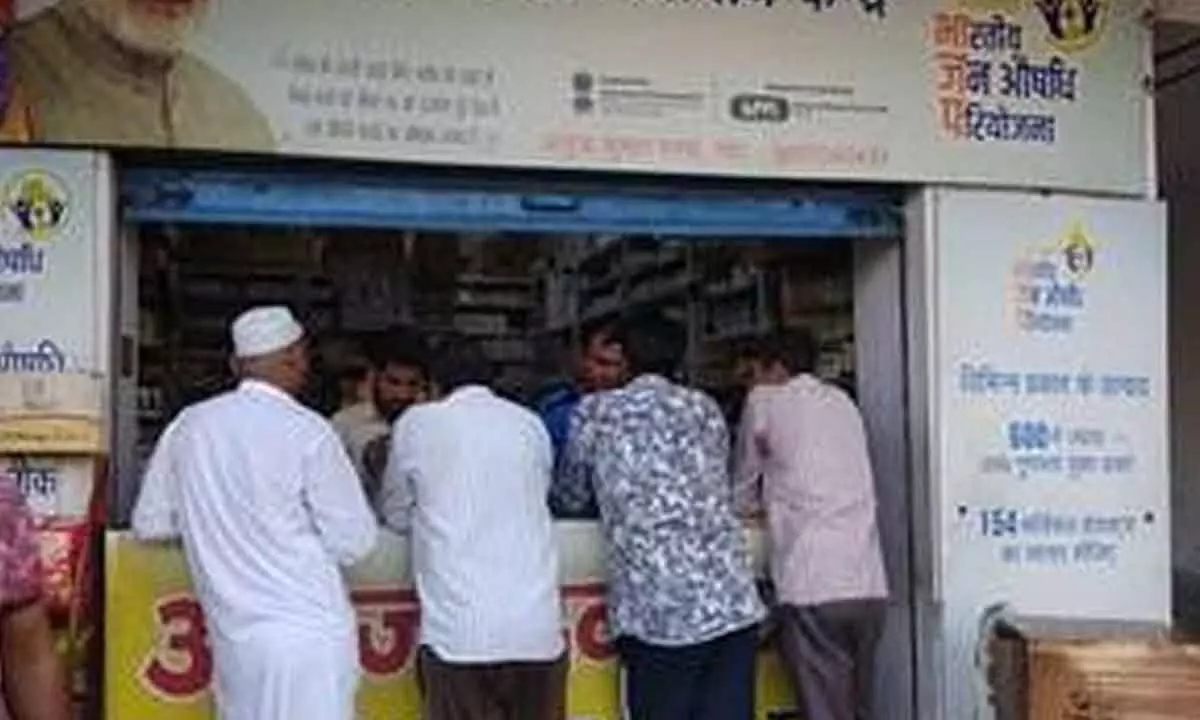Jan Aushadhi Kendras galloping towards the 10,000 mark
The central government’s ambitious program for making quality generic medicines available at affordable prices, the Pradhan Mantri Bhartiya Janaushadhi Pariyojana (PMBJP), is making rapid strides as Jan Aushadhi Kendras, being set up under the project, are galloping to the milestone of 10,000 stores across India.
image for illustrative purpose

The central government’s ambitious program for making quality generic medicines available at affordable prices, the Pradhan Mantri Bhartiya Janaushadhi Pariyojana (PMBJP), is making rapid strides as Jan Aushadhi Kendras, being set up under the project, are galloping to the milestone of 10,000 stores across India. As of May 31, the tally of the kendras stood at 9,484. The importance attached to the initiative gets evidenced from the fact that in March 2021, Prime Minister Narendra Modi himself had inaugurated the 7500th kendra at North Eastern Indira Gandhi Regional Institute of Health and Medical Sciences (NEIGRIHMS) in Shillong, through a video conference. Jan Aushadhi project was an ambitious project of the Department of Pharmaceuticals (DoP) which took-off with the launch of its first store on November 25, 2008 by then Union Chemicals minister Ramvilas Paswan in Amritsar. It was intended to provide quality generic medicines at affordable prices through its own stores.
In a market where almost 80 per cent of drugs are beyond price control, the DoP’s initiative would have proven to be a boon to millions of poor patients. The initial target of the scheme was to open at least 100 generic stores every year in various parts of the country. Unfortunately, the scheme did not gather momentum as vested interests within the government did not really want the scheme to prosper due to intense pressure from the industry lobby. As a result, the project dragged on for several years, and the target was not achieved. The government could open only a couple of hundred stores in the first seven years.
The project was literally relegated to the background till it drew the attention of the new government in 2016. It is not surprising that a populist scheme like Jan Aushadhi cannot be turned into a grand success that easily in a country like India where powerful forces were opposed to it. MNCs and large Indian companies were worried as generic stores could directly hit their sales. Traders, who are used to getting huge margins for the branded products from big pharma companies, do not want patients to go to generic stores at the cost of their business. Likewise, doctors, who have a critical role in making Jan Aushadhi a success, are also not cooperating as most of them are benefited for prescribing medicines of large companies. Eventually, the scheme got a fresh lease of life when the new government, led by Modi, not only saw it as a vehicle to provide affordable generics but also an employment avenue for thousands of small entrepreneurs. The scheme was then revamped and rechristened as Pradhan Mantri Bhartiya Janaushadhi Pariyojana (PMBJP) scheme in 2016. It hit the bull’s eye, so to say. Prices of medicines sold through Jan Aushadhi stores are cheaper by at least 50 per cent and in some cases medicines are cheaper by 80-90 per cent compared to medicines of pharma majors. By selling drugs with their chemical names, prices are bound to be far cheaper as promotional costs are not involved. The government has adopted a franchisee-like model and individual entrepreneurs can apply for establishing and running PMBJP Kendras. The project currently covers 743 of 764 districts in the country. The government is targeting 10,000 stores by the year-end.
The product basket of PMBJP comprises 1759 drugs and 280 surgical instruments. Further, new medicines and nutraceuticals products like protein powder, malt-based food supplements, protein bar, immunity bar, sanitizer, masks, glucometer, oximeter, etc. have also been launched.
Success of the scheme can be gauged from the fact that during the financial year (2021-22), PMBJP has achieved sales of Rs. 893.56 crore (at MRP). This has led to savings of approximately Rs. 5360 crore for the people. By February 15 of the current financial year, Pharmaceuticals and Medical Devices Bureau of India (PMBI), the implementing agency of PMBJP, has made sales of more than Rs 1000 crore which has further led to savings of approximately Rs. 6000 crore to the citizens. At present IT-enabled warehouses of PMBJP are functional at Gurugram, Chennai, Guwahati and Surat. Further, 36 distributors have been appointed across the country to support the supply of medicines in the remote areas. The initiative has saved more than Rs. 20,000 crore to the citizens on the cost of medicines. In the last nine years, the number of Jan Aushadhi Kendras has seen a significant growth, with their numbers increasing by 100 times and the sales by more than 170 times. Recently, CEO of PMBI, Ravi Dadhich asserted that 10,000 Jan Aushadhi Kendras will be functional by the end of the year. This clearly shows the determination of the government to provide quality generic medicines to the poor people at affordable prices. The government deserves kudos for resuscitating the project rather than pushing it into oblivion.

